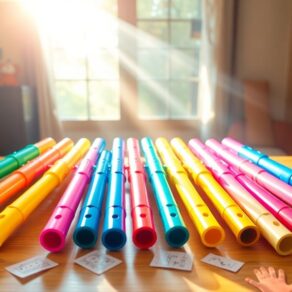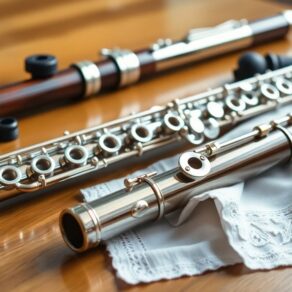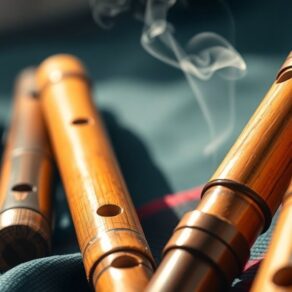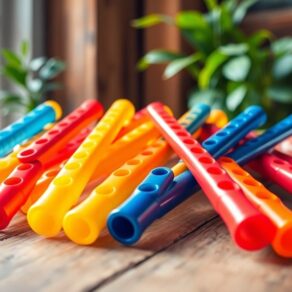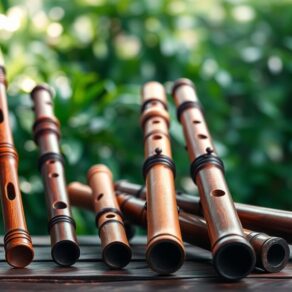If you're searching for the best open-hole flutes of 2024, you're in luck! Flutes like the Jean Paul FL-430 and Eastar C Flute provide comfort and great sound for beginners. The Glory Silver Plated options, including the one with a B foot joint, enhance your playing experience. Gemeinhardt's Model 3OB offers exquisite tone, while the Pearl 505RBE1RB stands out for its clarity. With various models catering to different skill levels and budgets, there's something for everyone. Keep exploring to find the perfect fit for your musical journey!
Key Takeaways
- Open-hole flutes offer enhanced control over dynamics and timbre, making them ideal for aspiring musicians and students.
- Ergonomic designs and durable materials like cupronickel or silver-plated metal ensure comfort and longevity during play.
- Key configurations, such as offset G and split E mechanisms, improve hand positioning and high note playability.
- Affordable options under $100 cater to beginners, while mid-range choices provide better tone and responsiveness for intermediate players.
- Essential accessories, like cleaning kits and carrying cases, enhance the learning experience and instrument maintenance for budding musicians.
Jean Paul FL-430 Intermediate Concert Open-Hole Flute – Silver-Plated
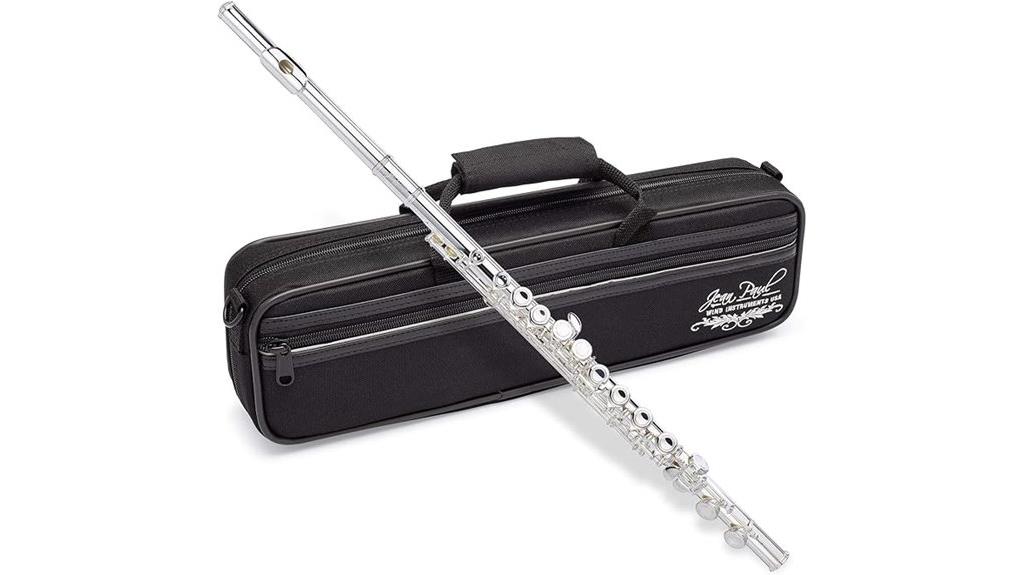
The Jean Paul FL-430 Intermediate Concert Open-Hole Flute is an excellent choice for determined students looking to elevate their playing experience. Crafted with a stunning silver-plated finish, this flute features a closed hole key system, offset G configuration, and C foot joint, making it user-friendly and accessible. Weighing just 3.43 pounds, its dimensions of 18.03 x 6.38 x 3.9 inches guarantee it's manageable for young musicians. You'll appreciate the impressive sound quality and durability, boosted by the high-quality carrying case, cleaning cloth, and rod included. While it's designed primarily for beginners, many users rave about its performance and value for money, making it a fantastic investment for your musical journey.
Best For: Determined students seeking a high-quality flute that supports their musical development.
Pros:
- Elegant silver-plated finish that adds aesthetic appeal.
- User-friendly design with closed hole keys ideal for beginners.
- Comes with a complete package including a carrying case and accessories.
Cons:
- Limited advanced features may not meet the needs of more experienced players.
- Primarily focused on entry-level musicians.
- Some users report minor issues with key response and finish wear.
Eastar C Flutes Open Hole Flute for Beginners
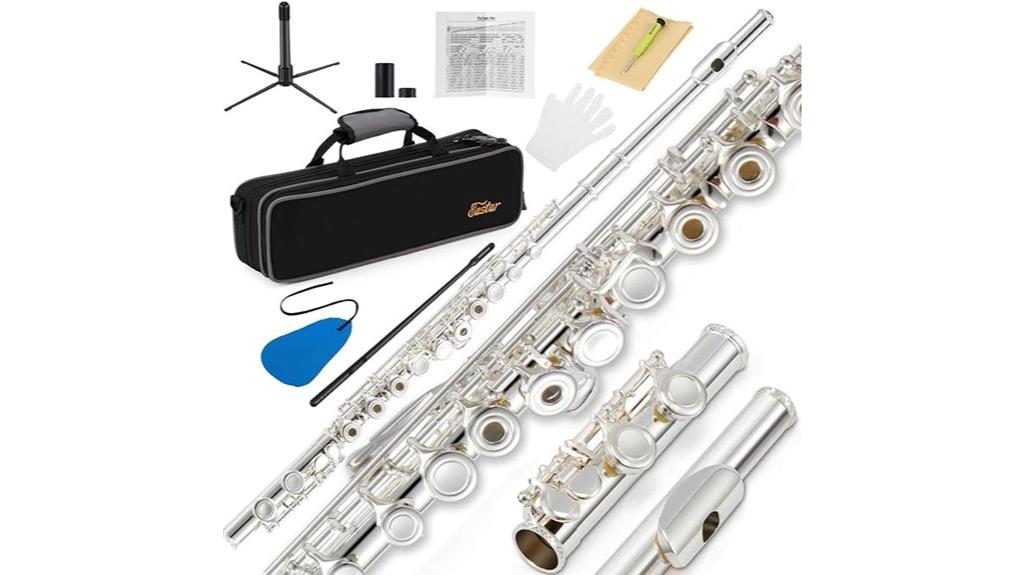
Designed specifically for beginners, the Eastar C Flute offers an exceptional introduction to the world of open-hole flutes. Its cupronickel body and ergonomic design make it comfortable to play, ensuring a smooth learning experience. You'll appreciate the split E key, which helps you hit those high notes with ease. The flute comes as a complete package, including a durable hard case, stand, cleaning kit, adjustment screws, and gloves, making it perfect for practice or travel. Customer reviews highlight its sound quality and ease of assembly, although some mention minor issues like tarnishing. Overall, the Eastar C Flute is a fantastic choice to kickstart your musical journey without breaking the bank.
Best For: The Eastar C Flute is best for beginners or students looking for an affordable, high-quality instrument to start their musical journey.
Pros:
- Excellent value for money, making it an ideal choice for beginners.
- Comfortable ergonomic design and split E key facilitate easier playability for high notes.
- Comes with a complete package including accessories for maintenance and travel.
Cons:
- Some users reported minor issues with tarnishing over time.
- A few players experienced challenges with certain notes when transitioning to higher-end flutes.
- Tight assembly may require some adjustment during initial use.
Glory Silver Plated Intermediate C Flute with B Foot Joint
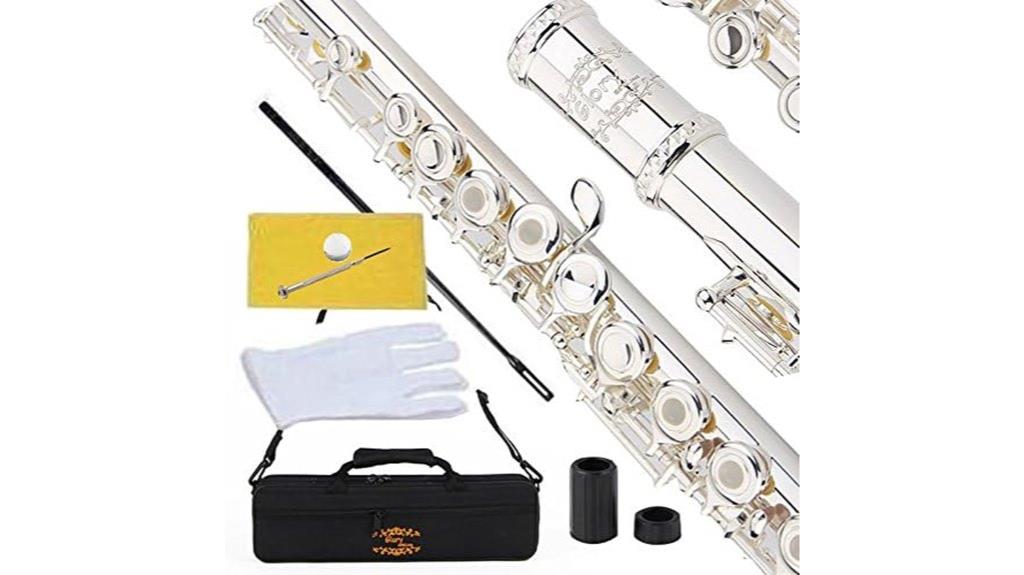
With its combination of a B foot joint and 17 keys, the Glory Silver Plated Intermediate C Flute is an excellent choice for aspiring musicians ready to elevate their playing. Crafted from durable cupronickel, it offers a sharp tone and loud volume, perfect for classical and jazz styles. You'll appreciate the responsive keys and the leather pads that guarantee water resistance and airtightness. It comes complete with a case, cleaning rod, cloth, and gloves, making it easy to maintain. While some higher and lower notes may take practice, its performance in the most used tonal range allows for soft, beautiful sounds. At just $169, it provides exceptional value, especially when compared to pricier models.
Best For: The Glory Silver Plated Intermediate C Flute is best for beginners and hobby players looking to transition into more advanced playing without breaking the bank.
Pros:
- High durability and excellent tone due to cupronickel construction.
- Responsive keys and beautiful sound production, suitable for various music styles.
- Great value for money at $169 compared to more expensive flutes.
Cons:
- Some users may experience minor issues like loss of plating over time.
- Not robust enough for very young or careless students, limiting its use in certain environments like marching bands.
- Higher and lower notes may require additional practice for optimal performance.
Gemeinhardt Model 3OB Flute, Open Hole, Offset G, B-Foot, Silver Plated
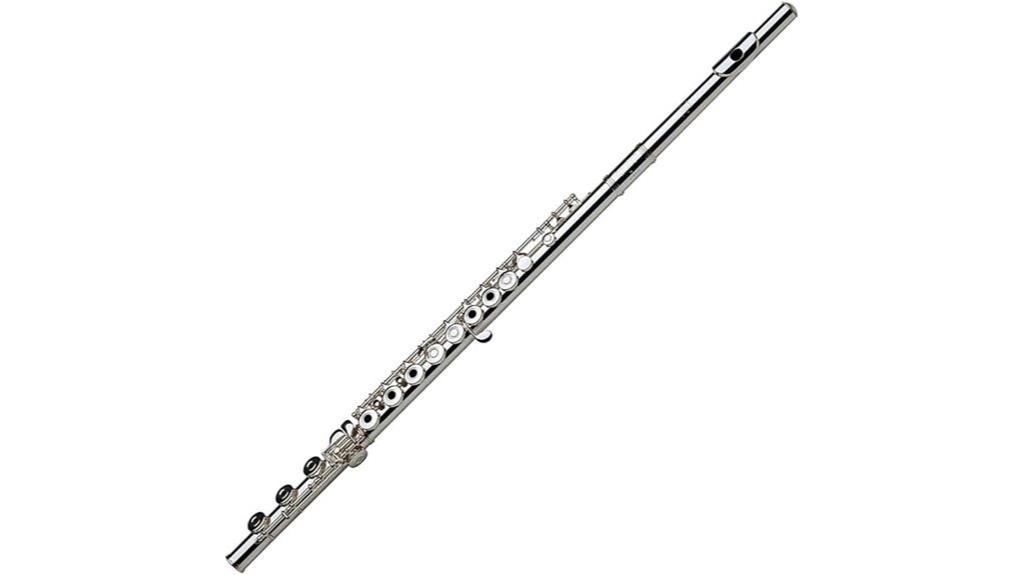
Ideal for intermediate players seeking to elevate their skills, the Gemeinhardt Model 3OB Flute offers a blend of quality and versatility. With its open-hole design, offset G, and B footjoint, this silver-plated flute enhances your playing experience. Users rave about its excellent tone and craftsmanship, making it perfect for band and orchestral settings. If you're adapting from a closed-hole flute, you'll find the included hole covers helpful as you adjust to open-hole play. Many players appreciate the added flexibility the B foot provides, allowing for lower notes. Priced reasonably compared to higher-end models, the Gemeinhardt 3OB is a solid investment, especially with included accessories like a cleaning rod and warranty. You'll be glad you chose this flute for your musical journey.
Best For: Intermediate players looking to enhance their skills and experience high-quality sound in band and orchestral settings.
Pros:
- Excellent tone and craftsmanship, praised by users for its sound quality.
- Open-hole design with included hole covers for easy transition from closed-hole flutes.
- Reasonably priced compared to higher-end models, providing good value for money.
Cons:
- Some users may require time to adapt to the open-hole keys if transitioning from a closed-hole flute.
- The silver-plated finish may require regular maintenance to keep it looking pristine.
- Not ideal for beginners who may struggle with the open-hole design initially.
Glory Silver Plated C Flute with Case and Accessories
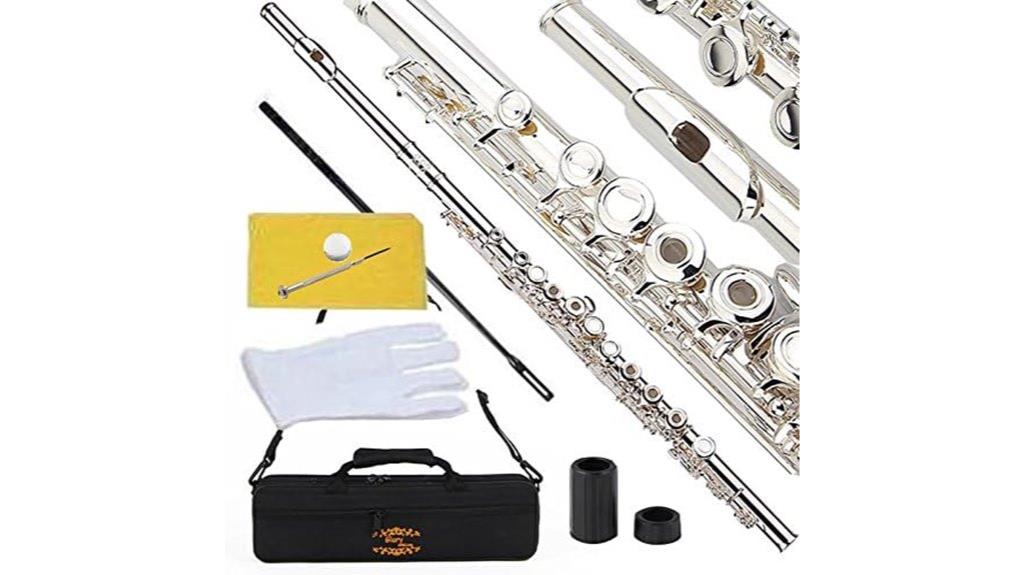
The Glory Silver Plated C Flute stands out as an excellent choice for intermediate players seeking a reliable instrument to enhance their musical journey. Crafted from durable cupro-nickel, this flute delivers a wonderful tone and features an open hole design with 16 keys. Its leather pads guarantee water resistance and airtightness, while high-grade needle springs promise longevity. Weighing just 2.01 pounds, it's lightweight and easy to handle.
Included in the package are essential accessories like a tuning rod, polish cloth, cork grease, and gloves, making it a complete set. With a 4.4-star rating from 692 customers, many praise its sound quality and appearance. It's an ideal option for students and budget-conscious musicians looking to advance their skills.
Best For: Intermediate players, junior high or high school students, and budget-conscious musicians seeking a reliable flute.
Pros:
- Durable cupro-nickel construction providing excellent tone quality.
- Lightweight design at 2.01 pounds for easy handling.
- Complete accessory set included for convenient maintenance and care.
Cons:
- Mixed reviews on tone quality, especially for beginners.
- Some users may find the open hole design challenging.
- Appearance may not meet the expectations of advanced players.
EASTROCK Open Hole Flute Instrument for Beginners
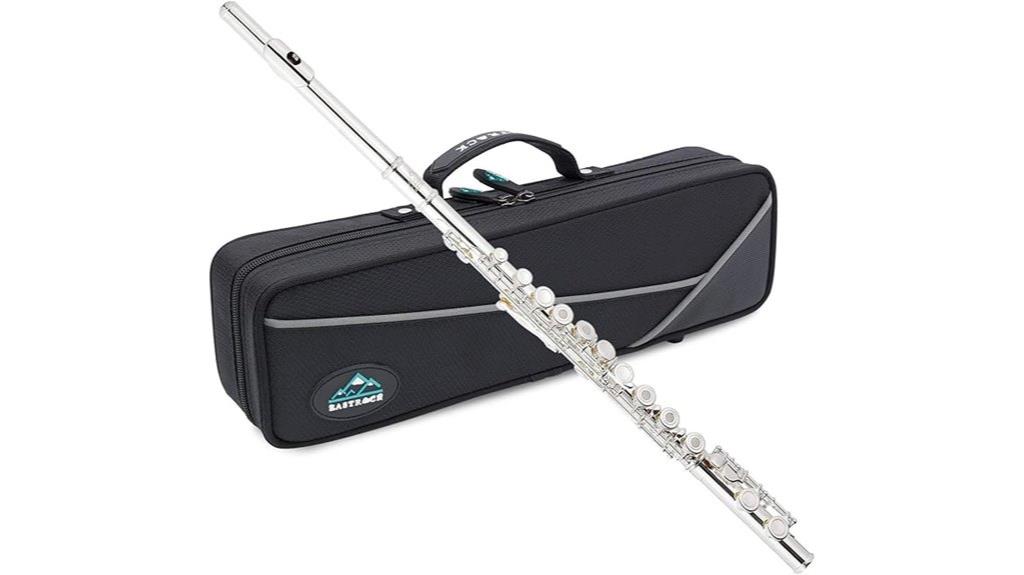
For beginners enthusiastic to explore the world of music, the EASTROCK Open Hole Flute Instrument stands out as an excellent choice. Crafted from durable cupronickel with silver plating, it offers both aesthetic appeal and longevity. With 16 ergonomically placed keys, you'll enjoy a natural playing experience while producing a clear, vibrant sound. The open/closed hole options allow you to gradually master techniques, making it perfect for your skill development. The all-encompassing accessory bundle, which includes a carrying case and cleaning kit, guarantees you can maintain your flute properly. Plus, with a 12-month warranty and 24/7 customer support, you'll have peace of mind. This flute combines affordability with impressive features, making it a solid investment for any aspiring musician.
Best For: Beginners, kids, and students looking to explore music with a durable and versatile flute.
Pros:
- Affordable option compared to higher-end flutes, providing good value for beginners.
- Ergonomic key placement ensures comfort and a natural playing experience.
- Comprehensive accessory bundle includes essential items for maintenance and care.
Cons:
- Some users report minor cosmetic issues with the finish.
- May have limitations for advanced players, as it's designed primarily for beginners.
- The sound quality, while good for beginners, may not meet the expectations of professional musicians.
Mendini By Cecilio Open Hole C Flute for Beginners
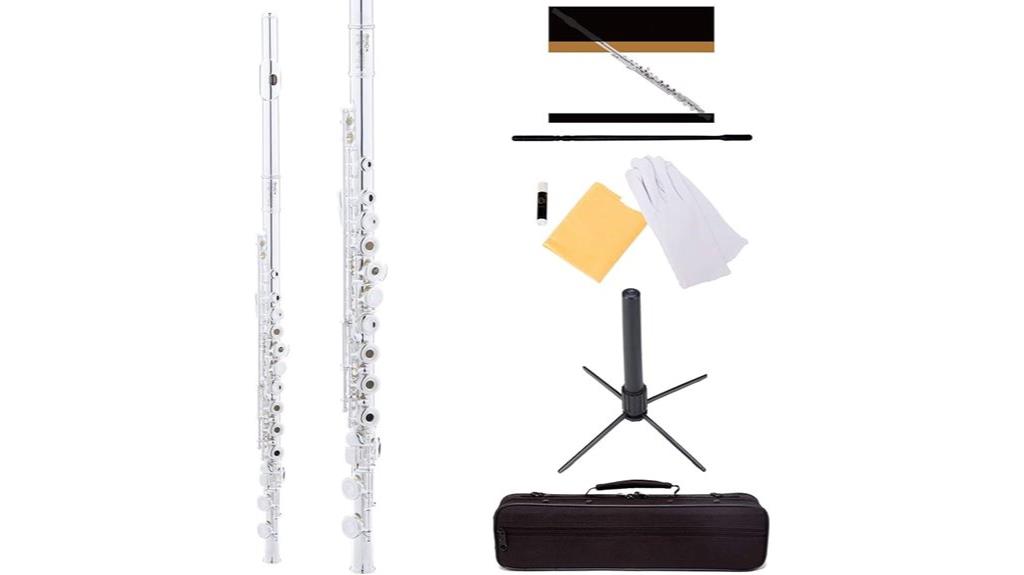
Looking for a solid starter flute without breaking the bank? The Mendini By Cecilio Open Hole C Flute is an excellent choice for beginners and casual players. With 16 keys, including an offset G key and a split E key, it offers versatility for learning. Its silver-plated cupronickel body guarantees durability while providing a decent sound quality that users appreciate for scales and simple songs. Plus, it comes with essential accessories like a plush-lined case, cleaning cloth, and even a foldable stand. While it's great for those unsure about long-term commitment, remember to handle it carefully, as it can be fragile. For under $100, it serves as a reliable introductory instrument, making flute playing accessible and enjoyable.
Best For: Beginners, kids, and casual players who want an affordable and functional flute to start their musical journey.
Pros:
- Great value for under $100, making it accessible for new players.
- Includes essential accessories like a plush-lined case and cleaning supplies.
- Positive reviews for ease of play and decent sound quality for simple songs.
Cons:
- Generally considered fragile, requiring careful handling to avoid damage.
- Common issues with keys bending or becoming out of tune.
- Repairs may be costly and difficult as many shops won't service low-cost flutes.
Glory Hand-Engraved Silver Plated High Grade Flute with Case
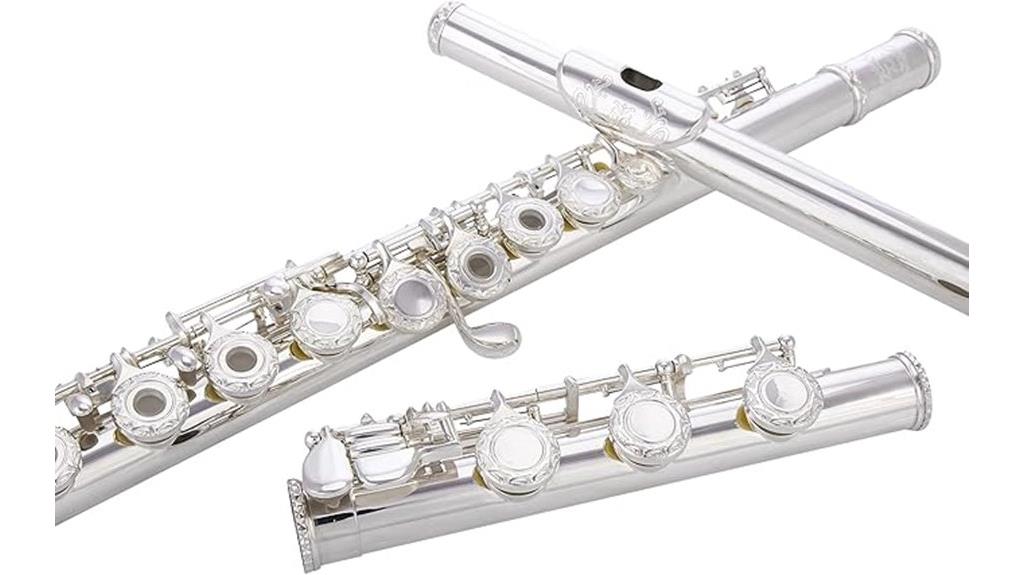
Crafted with an eye for detail, the Glory Hand-Engraved Silver Plated High Grade Flute stands out as an exceptional choice for intermediate players and budget-conscious students alike. Made from durable cupronickel, this flute features a 17-hole open/closed design and a low B foot, ensuring excellent sound quality comparable to flutes priced at $1000. You'll appreciate its clear, crisp tone, particularly in the lower register, making it a solid option for marching bands and wind ensembles. While it's ideal for junior high and high school students, adults returning to the flute will find it suitable too. Just be aware of minor assembly challenges upon arrival. Overall, this flute offers great value, combining aesthetics with reliability for your musical journey.
Best For: This flute is best for intermediate players and budget-conscious students seeking a quality instrument for performance and practice.
Pros:
- High-quality sound comparable to more expensive flutes, making it a great value.
- Attractive hand-engraved design that appeals to players' aesthetics.
- Durable materials and construction suitable for outdoor use and marching bands.
Cons:
- Mixed quality control reports, with some users receiving damaged or used instruments.
- Potential minor assembly issues upon arrival, requiring adjustment.
- Sensitivity to temperature changes can affect pitch stability.
BAHAMUT B Foot Flute (17 Key Instrument for Professional Performance)
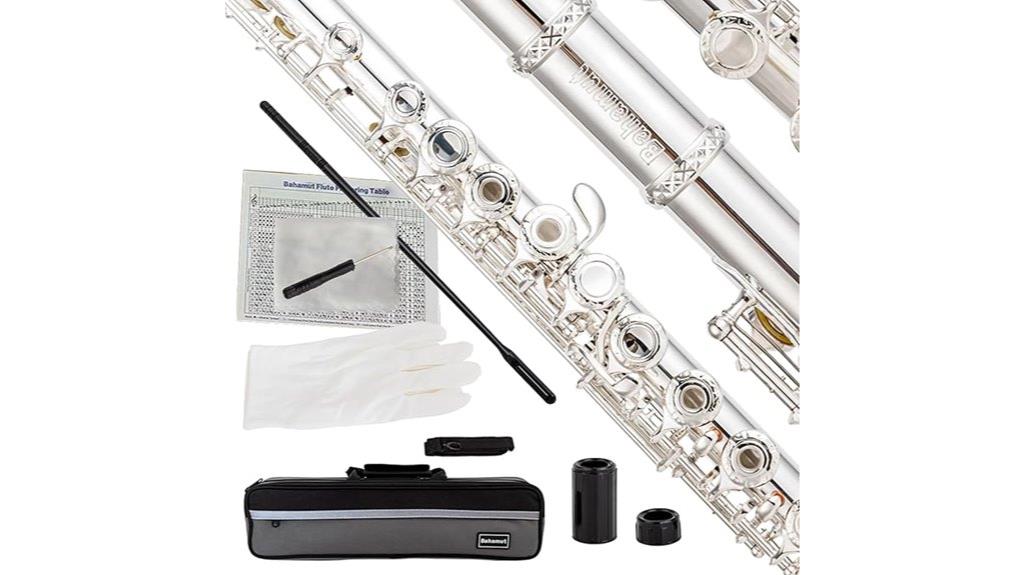
The BAHAMUT B Foot Flute stands out as an exceptional choice for budding musicians and students enthusiastic to refine their flute-playing skills. This 17-key open-hole flute features an offset G design, making it comfortable for those with smaller hands. Its split E mechanism guarantees a unified tone, particularly in higher registers. Crafted from durable cupronickel with a silver-plated finish, it produces bright, clear sounds ideal for practice. While it may not rival professional flutes, the BAHAMUT offers solid performance for learners. Users appreciate its responsive keys and the included cleaning kit. This flute is perfect for casual players, school band participants, and those on a budget, delivering excellent value for the price.
Best For: The BAHAMUT B Foot Flute is best for beginners and students looking for an affordable and comfortable instrument to develop their flute-playing skills.
Pros:
- Responsive keys and no air leakage, enhancing playability and sound quality.
- Offset G design provides comfort for players with smaller hands, reducing wrist strain.
- Includes a cleaning kit and superior case, ensuring easy maintenance and protection.
Cons:
- Lack of assembly instructions, which may lead to confusion for first-time users.
- Tone quality not comparable to professional flutes, limiting its use for advanced players.
- Sound production may require practice, particularly for achieving proper embouchure.
Pearl 505RBE1RB Quantz Series Flute
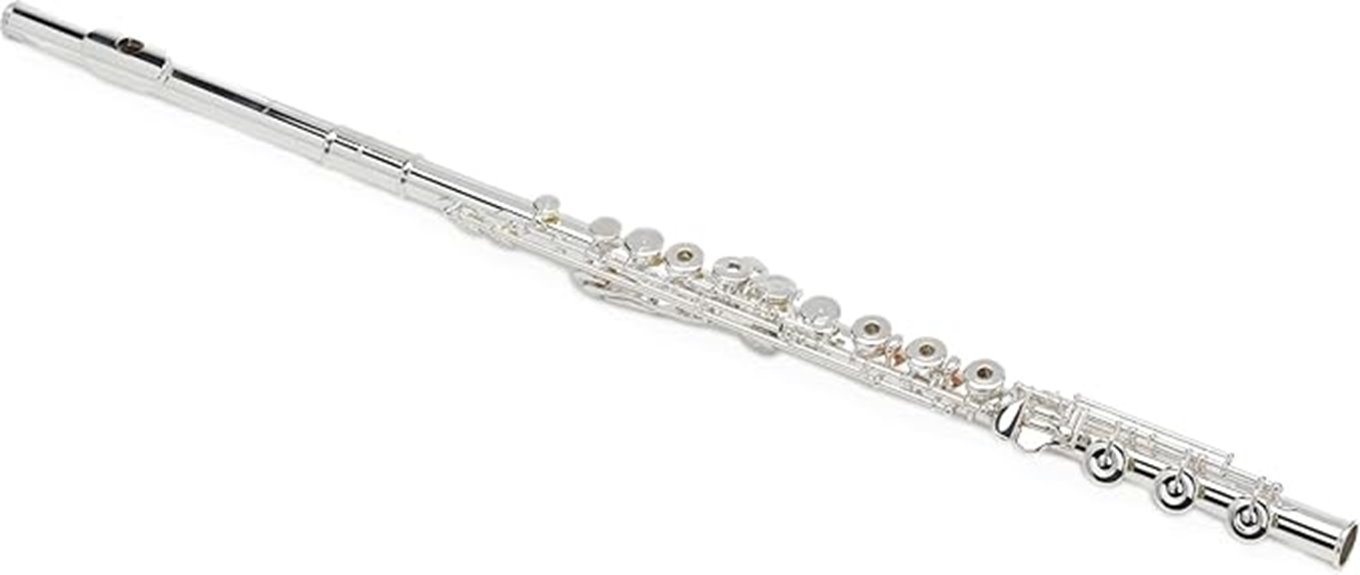
For intermediate to serious students enthusiastic to elevate their flute playing, the Pearl 505RBE1RB Quantz Series Flute stands out with its silver-plated construction and responsive design. This flute features a B-foot joint and open holes with plugs, making it perfect for those moving from closed hole models. Users rave about its clear, full tone and how responsive it is to airflow, enhancing your dynamics. Many players notice a significant improvement in sound quality compared to beginner flutes. It's reasonably priced for the quality it offers, and long-term users have found it to be a worthy upgrade after years of playing. With a French-style case included, it's a solid choice for musicians ready to advance their skills.
Best For: Intermediate to serious students looking to enhance their flute playing skills and sound quality.
Pros:
- High-quality sound: Produces a clear and full tone, enhancing dynamics and responsiveness to airflow.
- User-friendly features: Includes open holes with plugs for easy transition from closed hole flutes.
- Value for money: Reasonably priced compared to higher-end models with similar specifications.
Cons:
- Not suitable for beginners: Designed for intermediate to advanced players, may be challenging for novices.
- Weight: At 1 pound, it may feel slightly heavier than some beginner flutes.
- Limited availability: May not be as widely available as other beginner models, requiring specific searches to purchase.
Factors to Consider When Choosing Open-Hole Flutes
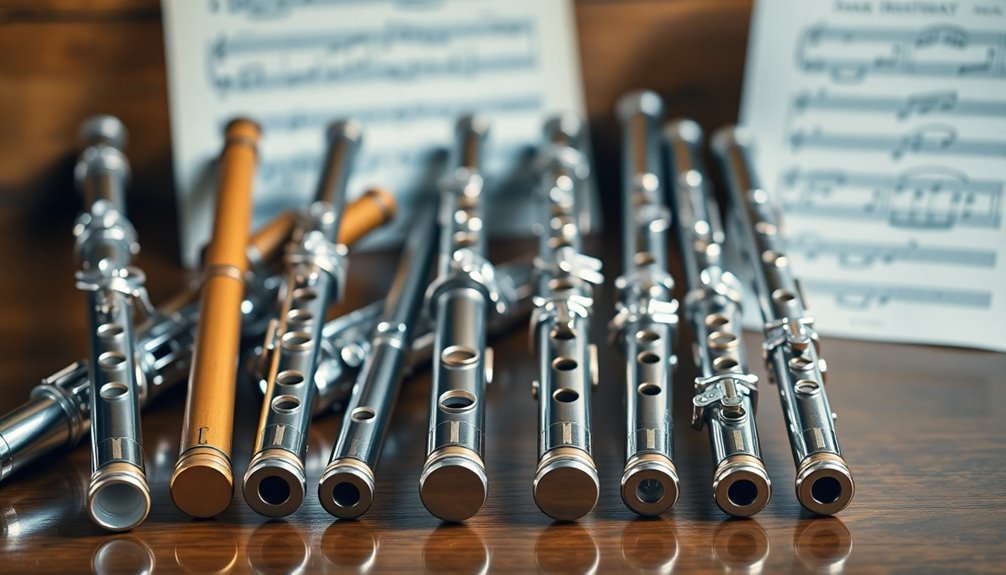
When you're choosing an open-hole flute, you'll want to take into account several key factors that can impact your playing experience. Think about build quality and materials, as well as your preferences for key configurations and sound quality. Don't forget to weigh the price against performance to guarantee you find the best fit for your needs.
Build Quality and Materials
Choosing an open-hole flute means paying close attention to build quality and materials, as these factors greatly influence your playing experience. Open-hole flutes are commonly made from cupronickel or silver-plated metal, both of which enhance durability and positively impact tonal quality. When you select a flute, consider how the craftsmanship affects sound production; higher-grade materials typically yield a clearer, more responsive sound.
Look for flutes that feature leather pads, as they provide better water resistance and air-tightness, vital for maintaining sound quality and playability. Ergonomic key placement and features like offset G keys can also improve comfort, especially if you have smaller hands. These design elements are fundamental for developing your technique without unnecessary strain.
Finally, a well-constructed flute will include high-grade needle springs, contributing to the longevity and reliability of key response over time. This means less maintenance and a better playing experience as you progress. By focusing on build quality and materials, you'll guarantee that your open-hole flute not only meets your current needs but also supports your growth as a musician.
Key Configuration Preferences
Key configuration preferences play an essential role in how comfortable and effective you feel while playing an open-hole flute. Most open-hole flutes come with an offset G key configuration, which is specifically designed to promote a more natural hand position. This can greatly enhance your playing experience, especially if you have smaller hands, as it reduces wrist discomfort and fatigue.
If you're shifting from a closed-hole flute, consider models that allow for plugs in the open holes. This feature lets you gradually adjust to open-hole techniques without overwhelming yourself. Additionally, some flutes include a split E key mechanism, which can improve your ability to play high notes with better tone and intonation.
When choosing between open and closed-hole configurations, think about your individual playing style and preferences. The key setup can influence your technique and control over finger placement, so it's vital to select one that aligns with your personal comfort and playing goals. Ultimately, understanding these key configuration options will help you make a more informed decision and enhance your overall flute-playing experience.
Sound Quality Considerations
Sound quality is often a top priority for flutists, especially when exploring open-hole models. The design of these flutes enhances your ability to control dynamics and timbre, resulting in a fuller and more nuanced tone. When choosing an open-hole flute, consider the materials used; for instance, cupronickel and silver plating greatly affect sound quality. Typically, silver-plated flutes produce brighter, clearer tones compared to more affordable options.
Additionally, look for flutes with a B foot joint, as this feature expands your tonal range and offers greater flexibility when playing lower notes. Ergonomic designs, including an offset G key and split E mechanism, can improve your finger placement and technique, providing a more responsive playing experience that enhances sound quality.
If you're shifting from closed-hole to open-hole flutes, you might notice a marked improvement in sound production and tone clarity. This improvement often comes as you develop your embouchure and control. By considering these factors, you can choose an open-hole flute that aligns with your musical goals and helps you achieve the sound quality you desire.
Accessories and Maintenance Tools
When it comes to selecting an open-hole flute, you'll want to reflect on the right accessories and maintenance tools that can enhance your playing experience. Many open-hole flutes come with a thorough accessory bundle, which typically includes a durable carrying case, cleaning kit, tuning rod, and gloves. These items are essential for proper maintenance and hygiene, ensuring your flute stays in top condition.
Professional-grade leather pads are also a key feature to evaluate. They provide water resistance and airtightness, significant for ideal sound quality and the longevity of your instrument. A tuning rod is important, especially for beginners, as it helps maintain pitch accuracy, which is essential when moving from closed to open-hole designs.
Regular polishing with appropriate tools can prevent tarnishing and prolong the finish of silver-plated flutes. Additionally, some flutes come with adjustment screws, allowing you to make minor modifications for improved playability. By investing in these accessories and maintenance tools, you not only protect your instrument but also enhance your overall playing experience, making your musical journey more enjoyable.
Price Versus Performance Ratio
Choosing the right open-hole flute involves carefully weighing the price versus performance ratio. You'll find that open-hole flutes can range considerably in price, with entry-level models often priced below $100. While these affordable options can be decent for beginners, models priced around $500 and above typically deliver superior sound quality and playability, as noted in user reviews.
If you're just starting out or uncertain about your commitment to the instrument, flutes under $200 can offer good value, providing an enjoyable playing experience. However, many players moving to mid-range flutes report noticeable improvements in tone quality and responsiveness, making it worthwhile to evaluate a higher-quality instrument.
Don't forget to factor in the long-term cost of ownership. While higher-priced flutes may require a larger initial investment, they often demand less maintenance and repair over time. This can lead to better value for serious musicians. Ultimately, it's important to balance your budget with your performance needs, ensuring that you choose a flute that not only fits your financial situation but also enhances your musical journey.
Frequently Asked Questions
What Is the Difference Between Open-Hole and Closed-Hole Flutes?
The difference between open-hole and closed-hole flutes primarily lies in their design and playability. Open-hole flutes have holes that aren't covered by pads, allowing for more nuanced fingerings and a broader tonal range. You'll find they can enhance your technique as you develop. Closed-hole flutes, on the other hand, have pads over the holes, making them easier to play for beginners since you won't have to worry about covering the holes perfectly.
How Do I Maintain My Open-Hole Flute?
Maintaining your open-hole flute isn't just important; it's like giving your instrument a luxurious spa day! Start by cleaning it regularly with a soft cloth to remove moisture and fingerprints. Use a cleaning rod with a cloth for the interior. Check the pads and springs for any issues, and don't forget to oil the key mechanisms occasionally. Treat your flute with care, and it'll reward you with beautiful music for years!
Can Beginners Use Open-Hole Flutes Effectively?
Yes, beginners can use open-hole flutes effectively, though it might take some practice. You'll need to develop precise finger placement to cover the holes fully. This can enhance your tone and control over time. It's a great way to learn proper technique, but start with a teacher or instructional materials to guide you. With patience and dedication, you'll find that playing an open-hole flute can be both enjoyable and rewarding.
What Accessories Are Essential for Open-Hole Flutes?
Imagine the soft sound of your open-hole flute filling a sunlit room. To enhance your experience, you'll need a few essential accessories. A cleaning kit keeps your flute in top shape, while a sturdy case protects it during transport. Don't forget a tuner for perfect pitch, and a metronome to keep your rhythm steady. With these accessories, you'll play with confidence and care, allowing your musical journey to flourish beautifully.
How Do I Choose the Right Flute Size for My Age?
Choosing the right flute size for your age depends on your physical attributes and comfort. Generally, younger players often need a smaller, more lightweight flute that fits their hands and mouth. Try different sizes to see what feels comfortable and allows you to produce a clear sound. Don't hesitate to consult a music teacher or professional for guidance, as they can help you find a flute that suits your needs and enhances your playing experience.
Conclusion
Choosing the right open-hole flute can make all the difference in your musical journey. Did you know that over 70% of professional flutists prefer open-hole designs for their expressive capabilities? With options like the Jean Paul FL-430 and the Pearl 505RBE1RB, there's something for every aspiring musician. So, whether you're just starting out or looking to elevate your skills, these flutes will help you hit the right notes and bring your music to life!

